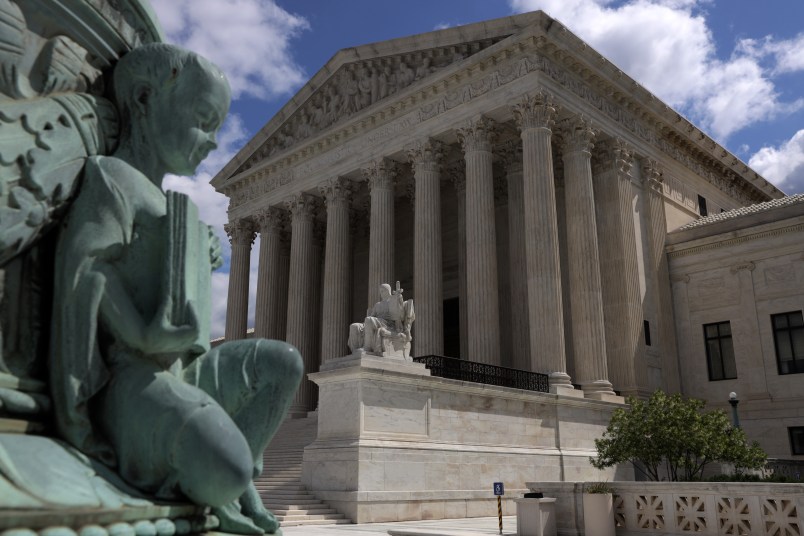The ugly fight over Texas’ refusal to expand absentee voting in the pandemic is now at the U.S. Supreme Court’s door step.
Texas’ Democratic Party on Tuesday asked for the Supreme Court to intervene in the federal case it has brought against Texas’ restrictions on absentee voting. Democrats argue that Texas’ current regime — which allows any voter 65 or older to vote absentee, but restricts the practice for voters younger than that unless they meet certain requirements — is a violation on the Constitution’s 26th Amendment, which bars age-based voter discrimination.
A federal district court judge agreed with the Dems’ arguments, but that decision was formally put on hold earlier this month by the conservative U.S. Court of Appeals for the 5th Circuit.
Texas Democrats are now asking for the Supreme Court to either immediately reinstate the trial judge’s decision expanding absentee voting or to hear the case on the merits as soon as possible, even before the appeals court hands down its final judgement.
The requests give the Supreme Court a second bite at the apple on voting issues prompted by the pandemic. It previously intervened in the court battle in Wisconsin over moves to expand absentee voting there. In that dispute, the Supreme Court said that the deadline could not be extended past the Election Day for voters to send in absentee ballots, a move that a federal judge ordered due to delays voters faced in receiving the ballots.
All four liberal justices dissented from the order, with Justice Ruth Bader Ginsburg writing for them that she feared it would “result in massive disenfranchisement.”
It will require the support of five justices to immediately lift the hold on the district court’s ruling in Texas, but only four votes are necessary for the court to take up the case on the merits. The process for doing so would mean, practically speaking, that there would not be a decision on the merits in time for Texas’ July primary.
The court would likely have to fast track the case — a move that requires five votes — if it were to be decided in time for the November election.
On a call with reporters, the Democrats’ attorney Chad Dunn pointed to a Texas redistricting case and the campaign finance case Citizens United as examples of when the Supreme Court took similar actions to speed up its consideration of cases because of the election schedule.
Dunn also said that the posture of this case differed from what the Supreme Court’s was dealing with in the Wisconsin dispute because Texas Democrats were giving the courts plenty of time to adjust the rules around the elections.
“We filed this federal case that very next day,” Dunn said, referring to the day the Supreme Court’s Wisconsin order came down, “to be sure that, when and if necessary, the U.S. Supreme Court had to review this case, it would do so with ample time before the November election. We could not be blamed for having gotten to the court too late.”
In addition to the federal lawsuit, Texas Dems sued Texas in state court over how it was handling voting in the pandemic. The state court lawsuit argued that lack of immunity to COVID-19 should qualify voters to vote absentee under the “disability” circumstance allowed by state election law. The Texas Supreme Court ultimately sided with the state in concluding that it did not. Throughout the litigation, Texas Attorney General Ken Paxton issued threats of criminal prosecution to anyone who encouraged voters to apply to vote absentee if they feared contracting coronavirus while voting in person. Paxton’s issued another one of those threats last week.
Paxton’s office’s issued a statement Tuesday calling the Democrats’ request for Supreme Court intervention was “clearly a ploy by the Texas Democratic Party to further confuse Texas voters.”
“This office will continue to defend the integrity of our electoral process,” Alejandro Garcia, the deputy director of communications in Paxton’s office, said.
Around eight states have age-based absentee restrictions similar to Texas’ on their books, according to Dunn, but many of them have expanded absentee voting due to the pandemic. Louisiana and Mississippi have similar age restrictions on absentee voting, and have not yet said how they will handle pandemic voting in November.
Read the Democrats’ filings with the Supreme Court below:







There are people who would stop you from voting.
The 26th Amendment argument is a good one, Maybe the newly-minted textualists Roberts and Gorsuch will bite.
Nah, who am I kidding?
Anyone visited the supreme court the past couple years? Is it true the portico has chiseled into it, “Lasciate ogne speranza, voi ch’intrate”?
Ya don’t say, especially since the supreme court fucks off for summer vacation from June 30th through October 4th.
I don’t see how this isn’t an equal protection case as well…old people shouldn’t have a more expansive right to vote than young people, regardless of the circumstances of the pandemic. I understand what Texas is doing, trying to block the democratic expression of it’s non-Republican (which means non-white) voters, which should also be a violation of the Constitution, as well as seen as morally wrong.
Here’s another reason Democrats really need to take the presidency and Senate and hold the House, it’s the only way we will see a new voting rights act, one that actually protects people and stops all of these efforts to block the ability of American citizens to vote.